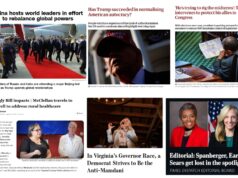 I just finished a new book on the “Virginia Way,” which I will review momentarily. But first, here are some quotes on said “Virginia Way” from leading Virginia politicians over the past few years. Keep these quotes in mind as you read the book review, because the contrast couldn’t be more extreme.
I just finished a new book on the “Virginia Way,” which I will review momentarily. But first, here are some quotes on said “Virginia Way” from leading Virginia politicians over the past few years. Keep these quotes in mind as you read the book review, because the contrast couldn’t be more extreme.
- In April 2012, then-Virginia Governor Bob McDonnell explained that the “Virginia Way” was the reason for “the spirit of sacrifice and helpfulness that the National Guard and other first-responders have demonstrated through tornadoes, hurricanes and a major earthquake during his first 2½ years in office.”
- In November 2012, after defeating George Allen for the U.S. Senate, Tim Kaine proclaimed: “This is the time to find common solutions to our nation’s common problems…That is the Virginia way.”
- In November 2014, Barbara Comstock “promised to get the country back on the right track via the ‘great Virginia way.'”
- Also in November 2014, as Mark Warner came down the home stretch in his reelection bid against Ed Gillespie, Warner waxed rhapsodic about that same “Virginia Way”: “There is something special about the Virginia Way, and John Warner has represented that every day of his public service.”
- Finally, Sorensen Institute head Bob Gibson explained the “Virginia Way” a few weeks ago as follows: it “assumes that the state politics are cleaner than most other states, that public officials are more civic minded.”
I could go on all day with this, as Virginia politicians love nothing better than to refer to the “Virginia Way,” our “AAA bond rating,” that Virginia is the “best place to….[fill in the blank],” blah blah blah. It’s basically all a total load of nausea-inducing stinking bull****, but that doesn’t stop ’em, and voters seem to lap it up as well,, so there you have it.
For me, having followed Virginia politics closely since 2005, including tons of sliminess and “legalized corruption,” when I hear politicians wax rhapsodic about the “Virginia Way,” I can’t decide whether to laugh, cry, or both. And after reading Jeff Thomas’ new book (“Virginia Politics & Government in a New Century: The Price of Power“), I’m still not sure, but I’m probably leaning a bit more towards crying.
Now, clearly the author of this book – Jeff Thomas, a Virginia native who attended Virginia Tech and is donating royalties from the book to Richmond’s public schools – is not unbiased on this topic. To the contrary, the book reads like a screed at time, albeit an extremely well-researched, encyclopedic, and sadly accurate screed. I mean, seriously, after reading each chapter, or even parts of chapters, I often felt like I needed a long, hot shower to wash off the stench of corruption reeking from all corners of Virginia. On the other hand, even more maddening is the complete cluelessness by most Virginians about how business is actually done in this state, and the vomit-inducing tendency by politicians to get all misty eyed and choked up at the mere mention of the nebulous, but apparently very speeecccccial,, “Virginia Way.”
I dare anyone to read this book, with its tale after tale of tawdriness, greed, shadowy power brokers, corporate money buying influence, the rich and powerful making out like bandits while inner-city schools fall apart, etc,, etc. – and still believe that the “Virginia Way” is in ANY way a good thing.
To the contrary, Thomas argues that the “Virginia Way” is a combination of: a) greed; b) pay-to-play; c) crony capitalism run amok; d) authoritarianism (as exemplified by strong “Dillon rule,” which prohibits localities in Virginia from doing…well, just about anything); e) a system “operated by a miniscule number of people…a few dozen politicians, CEOs and mandarins dictat[ing] economic policy in the state”; f) nontransparent (so much for transparency or freedom of information in Virginia); g) “Richmond-centric” (in particular, Thomas emphasizes the power of “shadow government” Richmond-based law firms like McGuire-Woods, Williams Mullen and Hunton and Williams, plus corporations like – yep, you guessed it! – Dominion Power and Altria, formerly known as Philip Morris), etc.
Examples of the aforementioned characteristics abound in the pages of Thomas’ book, and he clearly relishes ripping away at them. For instance, to quote Peter Galuszka in his Washington Post review of the book, “McGuireWoods, one of the state’s most prominent and wealthiest law and lobbying outfits, got more than $4.6 million in help from Richmond, otherwise crippled by a 25 percent poverty rate and crumbling school buildings, to build a new headquarters downtown.” Other examples include:
- Lawmakers allowing themselves essentially “unlimited latitude in using campaign funds for personal use.”
- A “revolving door” between Virginia government and wealthy/powerful corporations that donate to Virginia politicians.
- A system whereby many – if not most – important bills in the General Assembly are debated and decided upon without any public vote or transparency.
- A gazillion exemptions to the state’s already-weak FOIA laws.
- Gerrymandering run amok, so that basically politicians choose their voters and not the other way around.
- Many other forms of “incumbent protection,” which all but guarantee that once elected in Virginia, you are not going be voted out of there.
- The state’s slimy “cigarette slush fund.”
- Allowing powerful corporations, like the deplorable Smithfield Foods, to get away with all sorts of abuses.
- Another example from Galuszka’s review: “The Washington Redskins, the fifth richest team in the National Football League, got $11 million from Richmond to build a summer training camp that the Redskins use only three weeks a year.”
In short, examples of how the “Virginia Way,” far from being evidence of the Old Dominion’s virtues is actually a cesspool of corruption, are almost infinite. The question, again, is why anyone would fall for this nonsense. Read Thomas’ book and it’s highly unlikely that you ever will again, that’s for sure.
Criticisms of the book? Not many, but it could have used a better editing job so that its encyclopedic, impressive research might have flowed better as narrative. Also, I found some typos (can ANYONE in this damn state spell LOUDOUN correctly???) and some problems with Thomas’ account of how the “netroots took down Senator George Allen” (e.g., it most certainly was NOT just yours truly who started the Draft James Webb movement – in fact, several others, people like Josh Chernila and Lee Diamond, played a HUGE role, at least equal to mine). But all in all, if you have a strong stomach and really want to understand Virginia politics, this book is an important place to start.
P.S. I realized that no discussion of Virginia corruption would be complete without at least mentioning some of the “worst of the worst” in this regards. For instance, I’ve GOT to mention Senate Minority Leader Dick Saslaw (see Video: In Crude Language, Sen. Dick Saslaw Argues that Ethics Laws are Irrelevant, Unnecessary), who seriously believes that “lobbyists, campaign contributions and gifts” are NOT the “problem in Virginia,” that the REAL problem is electing people with a “computer chip in their head that’s not working, telling them the difference between right and wrong…and there’s no laws that you can pass…that would fix that…you couldn’t write a law to stop any of that.” Oh, and finally, Saslaw adds for good measure: “hell, we’ve got laws on the books – bank robbery, murder, armed robbery, embezzlement – and people still do it…because…they don’t know the difference between right and wrong.” In addition to Saslaw, of course, there’s Virginia House Speaker Bill Howell, basically a wholly-owned tool of corporate America (see VA Speaker Howell Leaps to ALEC’s Defense; Attacks Anna Scholl as Only Understanding “Little” Words, for instance). And then there’s Senate Majority Leader Tommy Norment, possibly THE most corrupt public official in Virginia at a high level, who admitted to relationship with lobbyist in leaked letter, also receives all kinds of gifts (e.g., lavish hunting trips) from corporate lobbyists, yet was appointed to Virginia ethics council! Amazing, huh? You really can’t overstate how slimy this is.














